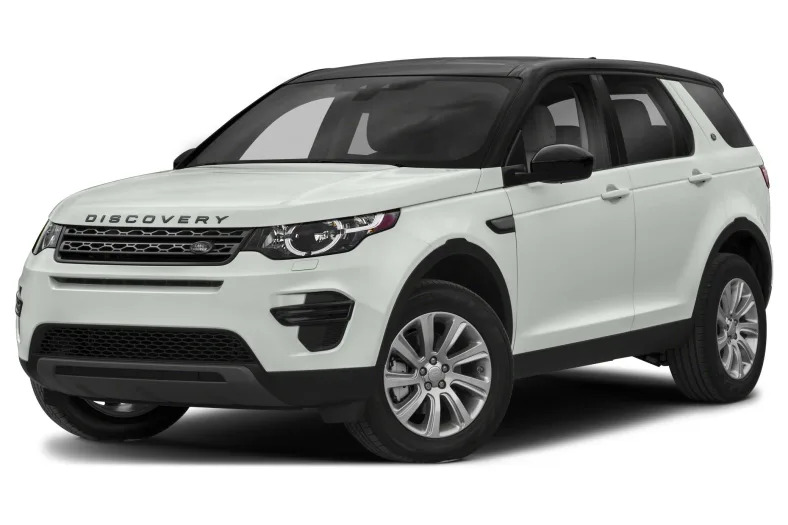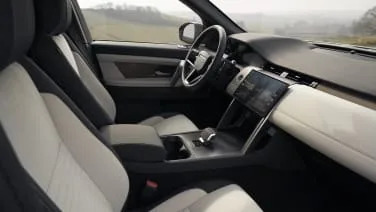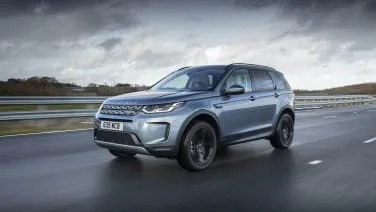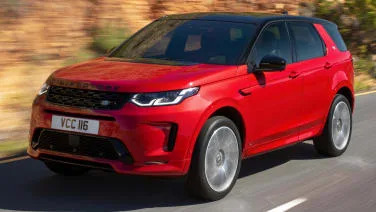HSE LUX 4dr 4x4
2018 Land Rover Discovery Sport
Land Rover Discovery Sport was created for 2015 as an entry-level model, replacing the LR2, and it's been upgraded a bit each year. Smaller than the Discovery, it's a highly capable unit-body SUV competing against premium crossovers like the BMW X3 and Mercedes-Benz GLC. The 2018 Discovery Sport offers a new engine with more power, a 2.0-liter turbocharged four-cylinder making 286 horsepower. The base engine makes 237 horsepower, and is smooth and strong enough, its turbocharger using less boost. Both engines are mated to a paddle-shifting 9-speed automatic that responds sharply.
One thing the Discovery Sport has on its rivals is an available third row, so it can theoretically seat seven passengers. However, it's not much of a third row, so Land Rover calls it a 5+2. The Discovery is better for seven passengers.
The Discovery Sport has a lot of the small Range Rover Evoque in it, although the Sport is a bit longer and wider.
Discovery Sport is 150 pounds lighter than the LR2 it replaced, thanks to an aluminum hood, roof and liftgate, as well as the use of high-strength steel in the chassis, about 20 percent of it. It's still too heavy to be nimble, but it handles with verve and tackles off-road challenges with ease.
All-wheel drive is standard. The Haldex system moves power between the front and rear wheels, up to 100 percent at each end, and then between the left and right wheels, depending on where the traction is needed. Its Terrain Response system has normal, grass/gravel/snow, mud/ruts, and sand modes, along with a new dynamic mode.
The Discovery Sport is rated to tow up to 5500 pounds, with standard Tow Hitch Assist, Tow Assist, and Trailer Stability Assist.
Even with direct fuel injection and the 9-speed transmission, fuel mileage for the Discovery Sport is disappointing, at 22 miles per gallon EPA Combined. And it requires Premium gasoline.
Whereas the Range Rover models are oriented around luxury, the Discovery line is oriented more around utility. Discovery Sport comes with a premium level of standard equipment, but luxury features like heated seats are optional.
Available safety equipment includes lane-departure warning, parking assist with perpendicular parking, trailer-sway control, and automatic headlamps. In the top two models, the optional automatic emergency system uses cameras to detect objects and will brake to reduce the impact or stop before impact if there's time, from a speed no more than 32 mph.
Full Review
Full Review
The 2018 Discovery Sport offers a new engine with more power, a 2.0-liter turbocharged four-cylinder making 286 horsepower. The base engine makes 237 horsepower, and is smooth and strong enough, its turbocharger using less boost. Both engines are mated to a paddle-shifting 9-speed automatic that responds sharply.
One thing the Discovery Sport has on its rivals is an available third row, so it can theoretically seat seven passengers. However, it's not much of a third row, so Land Rover calls it a 5+2. The Discovery is better for seven passengers.
The Discovery Sport has a lot of the small Range Rover Evoque in it, although the Sport is a bit longer and wider.
Discovery Sport is 150 pounds lighter than the LR2 it replaced, thanks to an aluminum hood, roof and liftgate, as well as the use of high-strength steel in the chassis, about 20 percent of it. It's still too heavy to be nimble, but it handles with verve and tackles off-road challenges with ease.
All-wheel drive is standard. The Haldex system moves power between the front and rear wheels, up to 100 percent at each end, and then between the left and right wheels, depending on where the traction is needed. Its Terrain Response system has normal, grass/gravel/snow, mud/ruts, and sand modes, along with a new dynamic mode.
The Discovery Sport is rated to tow up to 5500 pounds, with standard Tow Hitch Assist, Tow Assist, and Trailer Stability Assist.
Even with direct fuel injection and the 9-speed transmission, fuel mileage for the Discovery Sport is disappointing, at 22 miles per gallon EPA Combined. And it requires Premium gasoline.
Whereas the Range Rover models are oriented around luxury, the Discovery line is oriented more around utility. Discovery Sport comes with a premium level of standard equipment, but luxury features like heated seats are optional.
Available safety equipment includes lane-departure warning, parking assist with perpendicular parking, trailer-sway control, and automatic headlamps. In the top two models, the optional automatic emergency system uses cameras to detect objects and will brake to reduce the impact or stop before impact if there's time, from a speed no more than 32 mph.
Hide Full Review
Retail Price
| Engine | 2.0L I-4 |
| MPG | 21 City / 25 Hwy |
| Seating | 5 Passengers |
| Transmission | 9-spd w/OD |
| Power | 237 @ 5500 rpm |
| Drivetrain | Terrain Response four-wheel |





